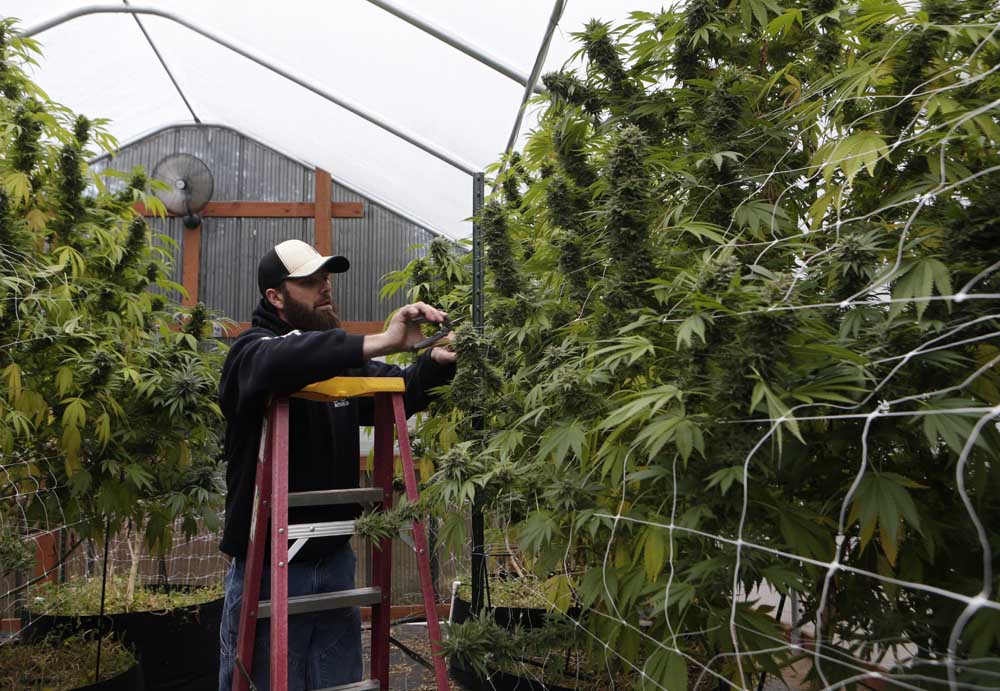Stricter proposed rules on marijuana draw a crowd
Published 12:00 am Wednesday, August 29, 2018

- Matt Toepfer, owner of High Desert Botanicals, does some pre-trimming on medicinal marijuana plants to prepare them for harvesting in his greenhouse in La Pine. Toepfer is like many marijuana growers in the county and could see changes as county officials review rules around marijuana production. (Joe Kline/Bulletin file photo)
The Deschutes County Commission heard from rural residents, cannabis growers, water experts and everyone in between about a set of stricter new rules on the county’s marijuana industry.
The commission held a public hearing Tuesday afternoon and evening on a series of proposed new and modified restrictions on marijuana production, processing, wholesaling and retail sales in rural parts of Deschutes County.
Trending
The proposed rules — the result of more than a year of meetings with a variety of state and federal agencies, local stakeholders and county staff — are more restrictive than the ones they would replace, with enhanced restrictions on odor, noise and water use for growers, along with a dramatic reduction in the land available for marijuana production.
Supporters and opponents packed the room, with roughly equal numbers of speakers for and against the proposals.
Rural residents broadly approved of the restrictions as a way of reining in an industry they see as running rampant in areas of the community, like Tumalo and Alfalfa.
Conversely, members of the marijuana industry largely opposed the new rules, which they saw as overly restrictive and a product of not having their comments included in the larger discussion about marijuana in Deschutes County.
“It’s so challenging to feel like you don’t have a voice,” said Lindsey Pate, co-founder of the Deschutes County cannabis operation Glass House Grown.
Deschutes County finalized its first round of rules on cannabis production in the fall of 2016, creating a regulatory framework in which growers are required to meet a series of restrictions before receiving county approval.
Trending
The County Commission always intended to revisit those rules to gauge how well they were working, and began exploring ways to fine-tune the regulations last fall.
The proposed rules would prohibit marijuana production and processing in parcels of the county’s multiuse agriculture zone, where lots tend to be smaller than those zoned exclusively for farm-use but larger than those zoned for rural residences. Additionally, the rule changes would expand the required buffer between marijuana growing operations and schools, national monuments and public land from 1,000 feet to a half-mile.
The changes also increased the number of places where a buffer would be required.
Tanya Saltzman, associate planner for Deschutes County, said during the hearing that the proposed rules would reduce the amount of land in the county available for marijuana production from nearly 209,000 acres to fewer than 50,000 acres, a reduction of more than 75 percent.
The number of available tax lots would drop to 1,218, down from 5,402 under the current rules.
The new rules would also require applicants to provide a report on an odor-control system — submitted by an engineer — demonstrating the effectiveness of the system and would require the odor control method to be independently tested.
The rules also provided additional restrictions on water use, requiring additional documentation about where water for a proposed grow is coming from.
The new restrictions respond to comments raised by a number of rural residents, who feel that the new industry has created unwelcome odors, reduced water in wells in certain areas and generally diminished the quality of life in parts of rural Deschutes County.
Liz Dickson, a land use lawyer who has focused on cannabis over the last year and a half, said restrictions need to be tailored to the specifics of Deschutes County’s farmland, where the soil that’s conducive to growing is limited, and rules prohibit outdoor growing. She said this makes marijuana fundamentally different from other crops in the region, and that it shouldn’t be grown on farmland.
“The basic problem that farmers in Deschutes County have with this whole concept is that you’re wasting our precious farmland on something that doesn’t use the soil,” Dickson said.
Still, members of the cannabis industry felt the restrictions punish legal recreational growers for sins committed by black market and medical growers.
“I think cracking down on the good actors is actually part of the problem, not part of the solution,” said Jennifer Clifton, founder of Bend-based Clifton Cannabis Law.
No additional hearings are currently planned, but the public can mail comments to the Deschutes County offices in Bend or email them to Saltzman at Tanya.Saltzman@deschutes.org. The deadline is Sept. 14.
—Reporter: 541-617-7818, shamway@bendbulletin.com








